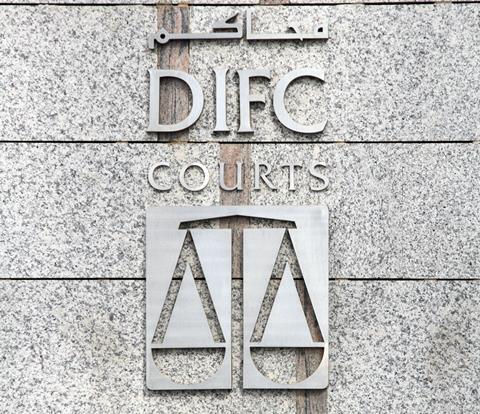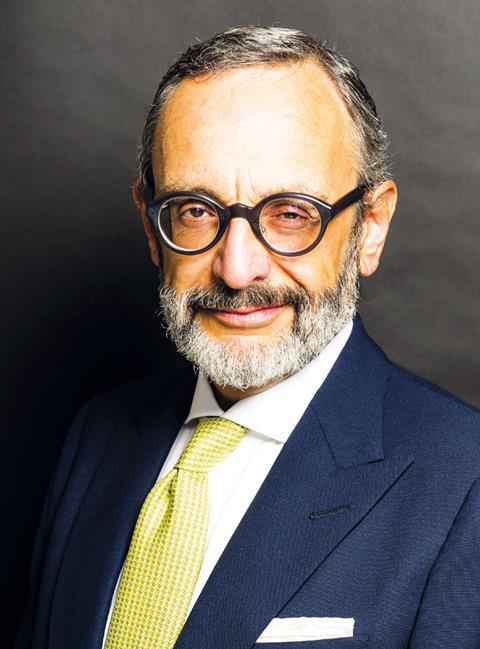As the Dubai International Financial Centre Courts unveils the world’s first digital economy court, justice Michael Black KC envisages a busy schedule when the court hears its first case listed for January
Imagine a smart contract which requires two digital keys to unlock a payment or release an asset. Both parties to the contract hold a key, with a third held by the court. In the event of a dispute, the court rules in favour or one or other of the parties – and unlocks the contract at the same time.

This is just one of the ideas bouncing around the creation of the world’s first digital economy court (DEC), the latest initiative of the pioneering Dubai International Financial Centre Courts in the United Arab Emirates. The DEC was set up as a specialist division of the courts to ‘facilitate the efficient and modern resolution of digital economy disputes’. Other jurisdictions, not least in the UK, will be watching with interest.
The DIFC courts administer an English-language common law system alongside the UAE’s Arabic language civil law jurisdiction. It has spawned many imitators in the Gulf and beyond since its establishment in 2004. In the first six months of this year, the main court of first instance handled 52 cases with an average value of £90m; half of the cases are from parties actively opting in to its jurisdiction.
Procedures are unapologetically modelled on the English system, but with an appetite for innovation and the adoption of new technologies – this year the DIFC opened the world’s largest solar-powered data centre.
The DEC division is the latest step in the creation of a ‘multi-doored courthouse’, the judge in charge, Michael Black KC of XXIV Old Buildings, told the Gazette. Its services include mediation, early neutral evaluation and a digital vault. A recent success is its wills registration service for non-Muslims. Among the probate orders granted this year was one for the estate of aviation entrepreneur Hamish Harding, one of the five people lost in the Titan submersible.
'We are in unknown territory – every case is going to be a learning experience. I want to start off with the ability to be flexible'
Justice Michael Black KC
The new court will take over some of the caseload of the DIFC’s technology and construction court, with its own set of rules. It will offer specialist expertise and its own procedure rules. These will cut down the time needed to get to the case management conference, Black said. ‘We then decide how to tailor the procedure to the particular case.’

Its first case is listed for January, an appeal in a dispute over the liability of a trusted intermediary when one of the parties to a contract is fraudulent. Black expects plenty of case traffic involving the fast-moving crypto scene – but he declined to predict what the eventual case mix will look like. He expects to see ‘quite a bit of regulation work’ and disputes arising from non-fungible tokens and Dubai’s thriving art market. ‘We are in unknown territory – every case is going to be a learning experience,’ he said. ‘I want to start off with the ability to be flexible.’
Cases involving parties registered with the DIFC automatically fall under the court’s jurisdiction, But Black hopes to attract a significant proportion of opt-ins attracted by speedy and expert service. ‘I’m pretty optimistic we’re going to have a fairly wide jurisdiction.’
All this creates huge opportunities for English law firms which already dominate the Dubai legal scene, Black said. He is profoundly irritated by depictions of the DIFC as an ‘offshore’ entity. ‘There is nothing offshore about the DIFC – it is highly regulated, with transparent laws, transparent ownership registers.’ After nearly 20 years of practising in the courts – where he spends half of his working time – he is proud of the DIFC’s role in promoting young Emirati nationals, particularly women. ‘Within the junior ranks of judicial officers we’re 60% female, which reflects the demographics of people coming into the profession.’
If it becomes reality, the smart contract execution service is likely to pique the interest of the current master of the rolls – a passionate enthusiast for on-chain procedures.
However, Black points out that such innovations are much easier to introduce in a small, flexible jurisdiction with a ‘can-do’ mindset. ‘In Dubai they are not afraid to be innovative, not afraid to fail. We are unapologetically experimental.’
Whether England and Wales chooses to adopt any of the DIFC’s innovations remains to be seen. But one certainty, Black says, is that the global digital economy will create plenty of work for dispute resolution in completely novel areas. ‘Who knows what cases will come in the door?’































No comments yet